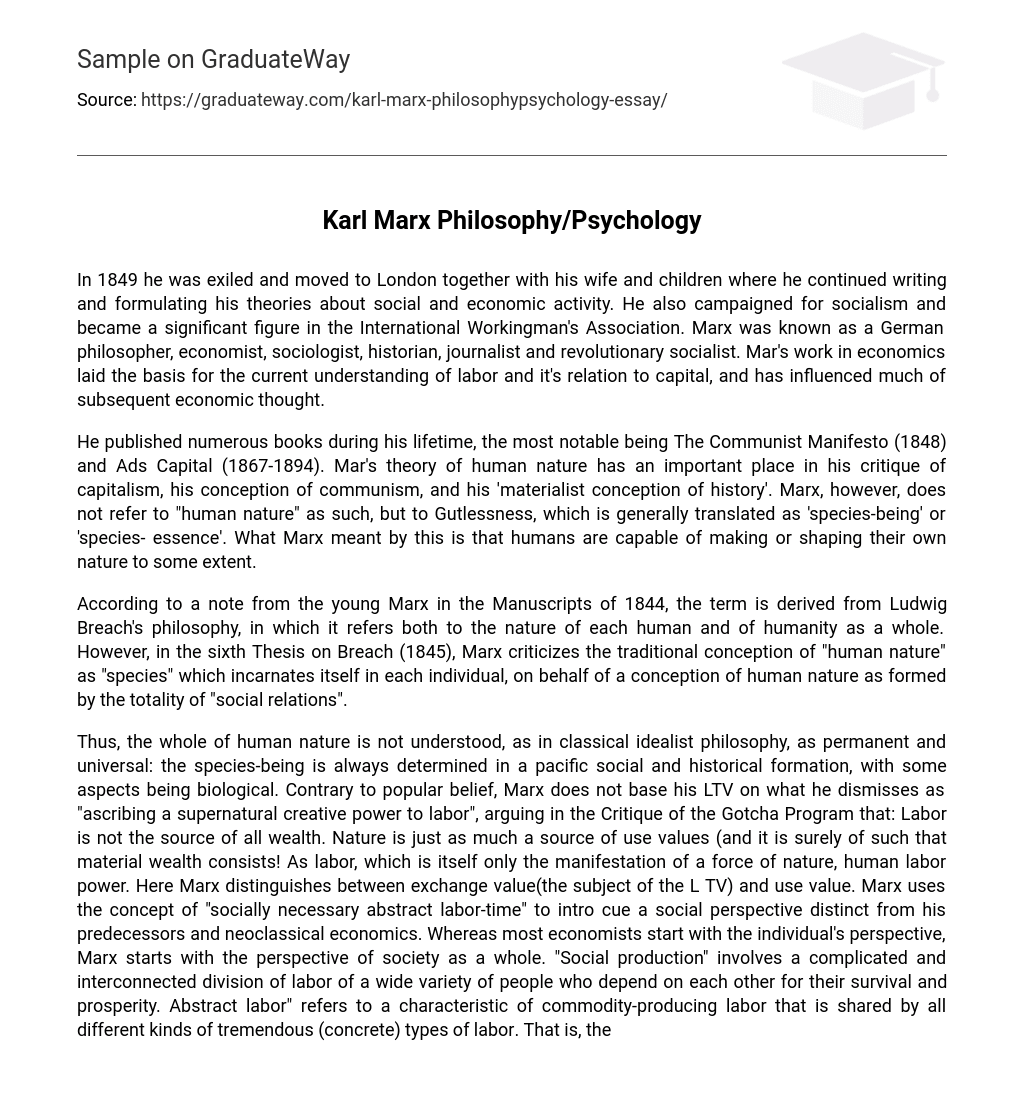In 1849 he was exiled and moved to London together with his wife and children where he continued writing and formulating his theories about social and economic activity. He also campaigned for socialism and became a significant figure in the International Workingman’s Association. Marx was known as a German philosopher, economist, sociologist, historian, journalist and revolutionary socialist. Mar’s work in economics laid the basis for the current understanding of labor and it’s relation to capital, and has influenced much of subsequent economic thought.
He published numerous books during his lifetime, the most notable being The Communist Manifesto (1848) and Ads Capital (1867-1894). Mar’s theory of human nature has an important place in his critique of capitalism, his conception of communism, and his ‘materialist conception of history’. Marx, however, does not refer to “human nature” as such, but to Gutlessness, which is generally translated as ‘species-being’ or ‘species- essence’. What Marx meant by this is that humans are capable of making or shaping their own nature to some extent.
According to a note from the young Marx in the Manuscripts of 1844, the term is derived from Ludwig Breach’s philosophy, in which it refers both to the nature of each human and of humanity as a whole. However, in the sixth Thesis on Breach (1845), Marx criticizes the traditional conception of “human nature” as “species” which incarnates itself in each individual, on behalf of a conception of human nature as formed by the totality of “social relations”.
Thus, the whole of human nature is not understood, as in classical idealist philosophy, as permanent and universal: the species-being is always determined in a pacific social and historical formation, with some aspects being biological. Contrary to popular belief, Marx does not base his LTV on what he dismisses as “ascribing a supernatural creative power to labor”, arguing in the Critique of the Gotcha Program that: Labor is not the source of all wealth. Nature is just as much a source of use values (and it is surely of such that material wealth consists! As labor, which is itself only the manifestation of a force of nature, human labor power. Here Marx distinguishes between exchange value(the subject of the L TV) and use value. Marx uses the concept of “socially necessary abstract labor-time” to intro cue a social perspective distinct from his predecessors and neoclassical economics. Whereas most economists start with the individual’s perspective, Marx starts with the perspective of society as a whole. “Social production” involves a complicated and interconnected division of labor of a wide variety of people who depend on each other for their survival and prosperity. Abstract labor” refers to a characteristic of commodity-producing labor that is shared by all different kinds of tremendous (concrete) types of labor. That is, the concept abstracts from the particular characteristics of all of the labor and is akin to average labor. “Socially necessary” labor refers to the quantity required to produce a commodity “in a given state of society, under certain social average conditions or production, with a given social average intensity, and average skill of the labor employed. ” That is, the value of a product is determined more by societal standards than by individual conditions.
This explains why technological breakthroughs lower the price of commodities and put less advanced producers out of business. Finally, it is not labor per SE, which creates value, but labor power sold by free wage workers to capitalists. Another distinction to be made is that between productive and unproductive labor. Only wage workers of productive sectors of the economy produce value “The worker becomes all the poorer the more wealth he produces, the more his production increases in power and range. The worker becomes an ever cheaper commodity the more commodities he creates.
With the increasing value of the world of things proceeds in direct proportion to the evaluation of the world of men. Labor produces not only commodities; it produces itself and the worker as a commodity and does so in the proportion in which it produces commodities generally. ” -Karl Marx, Economic and Philosophic Manuscripts, 1844. Marx uses his LTV to derive his theory of exploitation under capitalism. Firstly, I think Mar’s idea on humans being capable to make or shape their own nature to some extent is interesting. He thinks that things that are usually natural to a person’s mind or body can be changed and shaped by themselves.
This could be completely true. Environmentalists have a basic assumption that at birth the human mind is a tabular Rasa (a blank slate). This could mean that Mar’s idea of humans being able to “make” their own nature could be absolutely true. His idea could also be questionable as other people believe that at birth you already know how to breathe etc. Therefore, people wouldn’t be able to “shape” their own nature as they cannot decide when or when not they feel like breathing. Mar’s idea of labor not being the only form of wealth is interesting as he is eying that having a job is not tenthly way to be wealthy.





